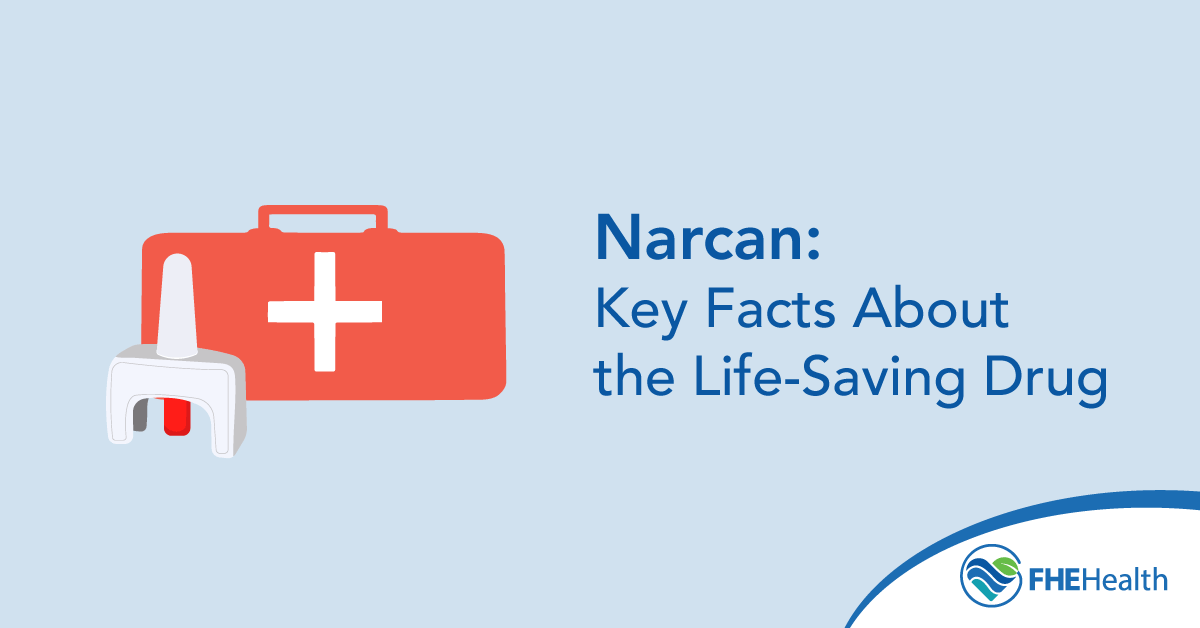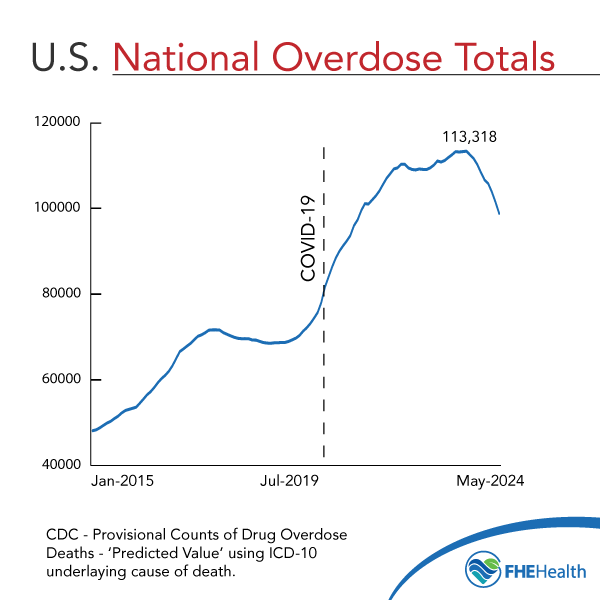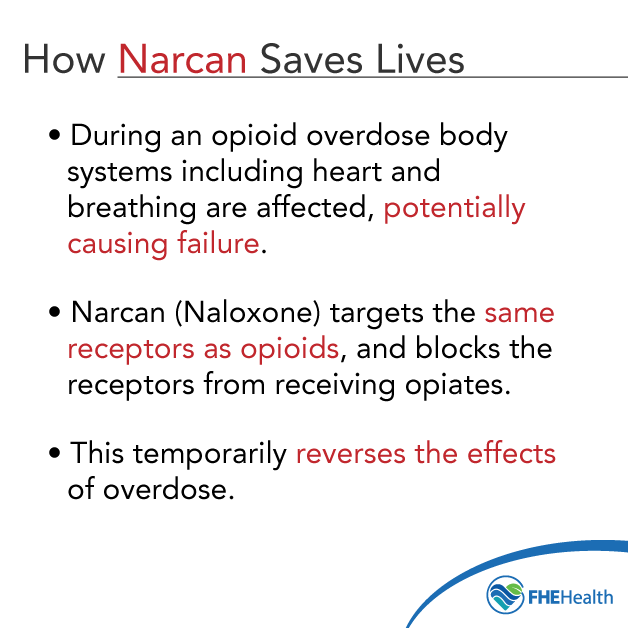
Narcan, one of the brand names for the generic drug naloxone, is a life-saving drug, but it’s one too many people don’t know enough about. Unlike many of the drugs we talk about here at FHE Health, our concern with Narcan is that more people should have access to it, not fewer. One fact about Narcan you may not know: It’s now easier to get.
What Is Narcan?
 Narcan is one of a few brand names for a drug known as naloxone (Evzio is another brand name version), which is used by first responders to reverse the effects of an overdose of any drug in the opiate family, natural or synthetic.
Narcan is one of a few brand names for a drug known as naloxone (Evzio is another brand name version), which is used by first responders to reverse the effects of an overdose of any drug in the opiate family, natural or synthetic.
These drugs include:
- Analgesic pain relievers like OxyContin, Percocet and Vicodin
- Heavy opioid sedatives like fentanyl and morphine
- Illicit opiates like heroin
- Other synthetic opiates like carfentanil and sufentanil
When someone begins to overdose on one of these drugs and is in a life-threatening situation, the user is given naloxone via injection or nasal spray and the overdose is temporarily stopped. This gives responders enough time to access more comprehensive medical interventions.
How Does Narcan Save Lives?
 The effects of opioids bind to receptors in the brain, producing chemicals that relieve pain and that produce pleasure. The latter is the reason people develop substance use disorders after only a short period of time using these drugs. Every substance under the opiate umbrella is extremely addictive, and generally, addicts begin to use more and more of their drug of choice to counteract the tolerance that gradually builds as they use it.
The effects of opioids bind to receptors in the brain, producing chemicals that relieve pain and that produce pleasure. The latter is the reason people develop substance use disorders after only a short period of time using these drugs. Every substance under the opiate umbrella is extremely addictive, and generally, addicts begin to use more and more of their drug of choice to counteract the tolerance that gradually builds as they use it.
When an overdose occurs, it’s because of the opiate’s ability to affect other body systems. If the user takes enough of one of these families of drugs, the systems of the body that regulate blood circulation, heart function and respiration are impacted to the degree that the person stops breathing. As of 2022, 25 in 100,000 people were dying of an opioid overdose, illustrating the deadly nature of these drugs.
Narcan (naloxone) is what’s known as an opioid antagonist. The drug isn’t an opioid, but it targets the same receptors in the brain. When used, Narcan blocks the opioid from affecting the brain and temporarily reverses the effects of the overdose on the respiratory system. This restores the user’s breathing and allows the person who administered the Narcan to get the user into a stable, medical treatment.
Facts About Narcan: Who Can Use It?
Discussing the issue of who administers Narcan actually splits into two discussions: Who does use the drug and who should?
In the status quo, emergency medical personnel and EMS first responders are the primary parties involved in administering Narcan prescriptions. Police and fire departments have to receive special training instructing them on how to use the drug and how to identify someone in need of Narcan, particularly in parts of the country where the opioid crisis has been severe.
These movements to get Narcan into the hands of more emergency personnel appear to be making an impact on reducing deaths. However, opioid overdose requires immediate medical care. In some instances, professional first responders may not be able to arrive in time.
Who Should Be Using Narcan?
So, who should have the drug handy and know how to administer it? Preferably everyone. While drug overdoses are much more common in some parts of the country, you truly never know when someone near you is going to need intervention using a specialized medication.
According to Shatterproof FHE Health, an opioid addiction advocacy group, U.S. Surgeon General Jerome Adams has issued an advisory about Narcan and other drugs containing naloxone. Adams recommends that more people should be trained to use naloxone and carry it on their person whenever possible. By learning some simple facts about Narcan, you can give someone a second chance at recovery and life.
How to Administer Narcan Safely
In 2023, the U.S. Food and Drug Administration (FDA) approved the first over-the-counter (OTC) naloxone product to help reduce overdose deaths. The 4-milligram Narcan nasal spray is now available without a prescription at pharmacies, grocery stores, big box retailers and online. Access and availability may vary by state.
OTC Narcan is easy to use and can be administered by anyone — with or without medical training. The medicine should be given immediately when a person shows signs of an opioid overdose.
Steps for Responding to an Emergency Opioid Overdose with Narcan
- Try to wake the person up. If they’re not breathing or responding, or have cold and clammy skin, it’s time to take action.
- Administer Narcan nasal spray. Lay the person on their back and tilt their head up. Insert the Narcan nozzle into one of their nostrils and press the plunger firmly to spray.
- Call 911 for help. Give your exact location, report what you see, and tell EMS what drugs were used if known.
- Stay with the person. Roll the person to their side and monitor breathing until medical assistance arrives. Give another dose of Narcan in the opposite nostril every 2-3 minutes if they remain unresponsive.
Side Effects of Narcan
After someone is given a dose of Narcan, they may experience side effects. They should be closely monitored, preferably in the hospital, for these symptoms:
- Nausea
- Vomiting
- Body aches
- Tiredness
- Dizziness
- Body weakness
The Importance of Having Narcan in Public Spaces
Opioid reversal agents have the power to save lives, but only if they’re available and administered quickly at the scene of an overdose. According to a report from The Reagan-Udall Foundation for the FDA, bystanders were present but unable to provide naloxone in approximately 46% of fatal overdoses in 2021.
When overdose reversal drugs are available for community use, fewer people die. Cities and states across the United States are finding helpful ways to make Narcan more widely available, including stocking them in schools, free vending machines and AED cabinets in public spaces.
Should You Carry Narcan?
Anyone can now buy and carry OTC Narcan. Consider keeping the spray in your emergency first aid kit if you or a family member takes prescription opioids or you know someone with opioid use disorder. Having it on a hand offers an extra layer of protection, especially for people with a higher risk of overdose.
Why Narcan, Specifically?
While some other opioid reversal agents require training a person to administer an injection of the drug, OTC Narcan is given via a simple nasal spray that takes little to no training to master. All the responder has to do is take the spray canister out of the packaging, put two fingers on the plunger, place the nozzle into the opening of the victim’s nostril and squeeze to discharge the plunger.
In addition, Narcan doesn’t typically cause serious side effects or negative reactions. If you suspect someone is having an overdose but you’re not sure what caused it, you can give Narcan without worry. It only reverses the effects of opioids and won’t cause harm if they took a different type of drug. When in doubt, use it.
What Does Narcan Cost?
Most health insurance plans cover prescription and OTC Narcan, but getting preapproval may be difficult when buying Narcan as a preventive measure. Check with your provider. If paying out of pocket, OTC Narcan costs about $50 per package. It should count as a qualifying product for your health savings account or flexible spending account.
 If you have trouble accessing Narcan due to cost, most local governments (especially in areas where overdoses are common) sponsor community Narcan training where volunteers can access the drug for free. In some states, harm reduction organizations provide individuals with Narcan for little to no cost.
If you have trouble accessing Narcan due to cost, most local governments (especially in areas where overdoses are common) sponsor community Narcan training where volunteers can access the drug for free. In some states, harm reduction organizations provide individuals with Narcan for little to no cost.
Other Uses of Naloxone
Naloxone is also used in many treatment programs all over the country as part of a drug called Suboxone. Suboxone represents the new age of medication-assisted treatment (MAT), replacing methadone for people addicted to heroin and other opiates. In this drug — commonly prescribed in strips that the user places under their tongue — naloxone is mixed with the key active ingredient, buprenorphine. This is because buprenorphine is an opioid agonist and is addictive on its own. Because naloxone can bring on the symptoms of acute opioid withdrawal, it exists in
Suboxone so that patients use it as directed.
Narcan Facts: The Bottom Line
It’s clear that Narcan and other drugs containing naloxone have a high potential to save lives. As death rates from opioid overdoses continue to rise, more people need to have access to both the drug and information about how to use it.
For more information on providing medically assisted intervention during an overdose, contact FHE Health today.






